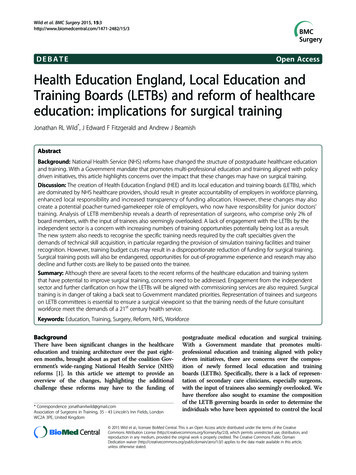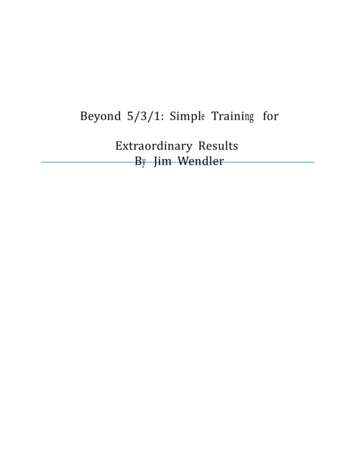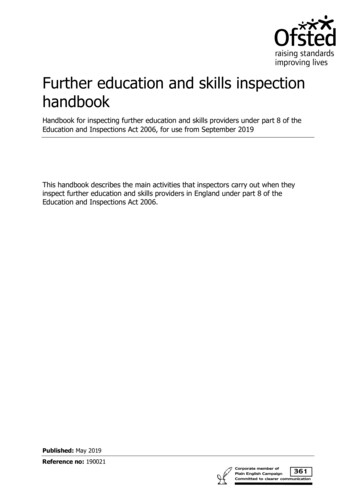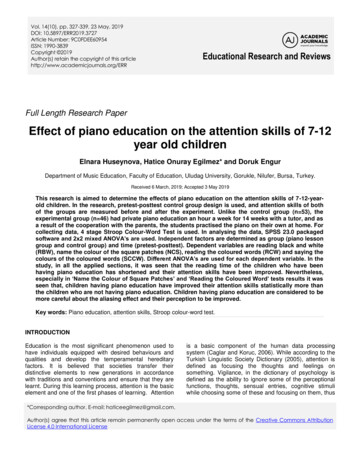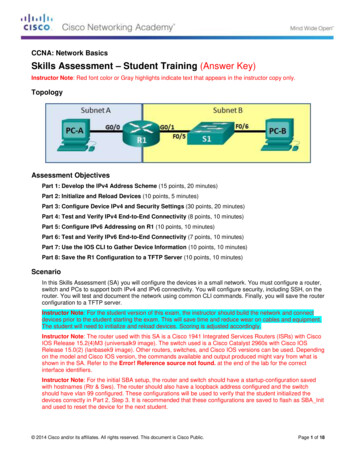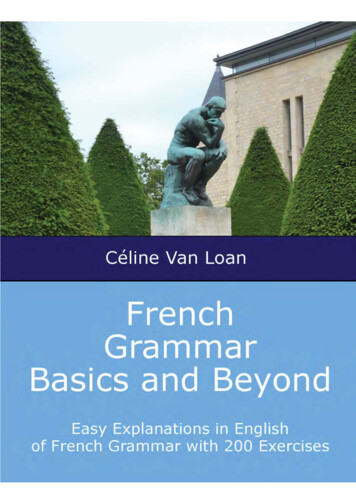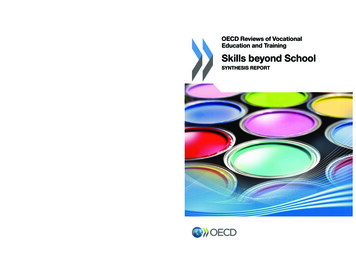
Transcription
Skills beyond SchoolSynthesis ReportHigher level vocational education and training (VET) programmes are facing rapidchange and intensifying challenges. What type of training is needed to meet the needsof changing economies? How should the programmes be funded? How should theybe linked to academic and university programmes? How can employers and unions beengaged? The country reports in this series look at these and other questions. Theyform part of Skills beyond School, the OECD policy review of postsecondary vocationaleducation and training.ContentsSummary and policy recommendationsChapter 1. The hidden world of professional education and trainingChapter 2. Enhancing the profile of professional education and trainingChapter 3. Three key elements of high-quality post-secondary programmesChapter 4. Transparency in learning outcomesChapter 5. Clearer pathways for learnersChapter 6. Key characteristics of effective vocational systemsSee also www.oecd.org/education/vet.For more information about OECD work on skills, see http://skills.oecd.org.This work is published on the OECD iLibrary, which gathers all OECD books, periodicals andstatistical databases.Visit www.oecd-ilibrary.org for more information.isbn 978-92-64-21467-591 2014 05 1 P9HSTCQE*cbeghf Synthesis ReportConsult this publication on line at http://dx.doi.org/10.1787/9789264214682-en.Skills beyond SchoolFurther readingOECD (2010), Learning for Jobs, OECD Reviews of Vocational Education and Training,OECD Publishing.OECD Reviews of Vocational Education and TrainingOECD Reviews of Vocational Education and TrainingOECD Reviews of VocationalEducation and TrainingSkills beyond SchoolSynthesis Report
OECD Reviews of Vocational Education and TrainingSkills Beyond SchoolSYNTHESIS REPORT
This work is published on the responsibility of the Secretary-General of the OECD.The opinions expressed and arguments employed herein do not necessarilyreflect the official views of the Organisation or of the governments of itsmember countries.This document and any map included herein are without prejudice to thestatus of or sovereignty over any territory, to the delimitation of internationalfrontiers and boundaries and to the name of any territory, city or area.Please cite this publication as:OECD (2014), Skills Beyond School: Synthesis Report, OECD Reviews of Vocational Educationand Training, OECD enISBN 978-92-64-21467-5 (print)ISBN 978-92-64-21468-2 (PDF)Series: OECD Reviews of Vocational Education and TrainingISSN 2077-7728 (print)ISSN 2077-7736 (online)The statistical data for Israel are supplied by and under the responsibility of the relevantIsraeli authorities. The use of such data by the OECD is without prejudice to the status of theGolan Heights, East Jerusalem and Israeli settlements in the West Bank under the terms ofinternational law.Photo credits: Fotocrisis/Shutterstock.comCorrigenda to OECD publications may be found on line at: www.oecd.org/publishing/corrigenda. OECD 2014You can copy, download or print OECD content for your own use, and you can include excerpts fromOECD publications, databases and multimedia products in your own documents, presentations, blogs,websites and teaching materials, provided that suitable acknowledgment of the source and copyrightowner is given. All requests for public or commercial use and translation rights should be submitted torights@oecd.org. Requests for permission to photocopy portions of this material for public or commercialuse shall be addressed directly to the Copyright Clearance Center (CCC) at info@copyright.com or the Centrefrançais d’exploitation du droit de copie (CFC) at contact@cfcopies.com.
ForewordForewordSkills are critical to economic growth and social well-being. Although initial vocationaltraining at upper secondary level provides useful skills, in many jobs where demandis fast-growing – ranging from healthcare technicians to junior managers – such basicvocational training is no longer enough. Indeed, higher level professional, managerialand technical skills are increasingly required. In the United States, it is estimated thatone third of all vacancies by 2018 will call for some post-secondary qualification, butnot necessarily the completion of a four-year degree.Based on a series of 20 country studies, this synthesis report of Skills beyondSchool looks at how OECD countries are responding to this growing demand for skills,and the further steps they need to succeed. The report underlines many challenges:while some countries have thriving post-secondary vocational sectors, others havefound it difficult to find a place for shorter (one-or two-year) programmes in competitionwith better known academic qualifications. The engagement of the social partners –employers and trade unions – is as vital as it is sometimes elusive. Vocational trainingqualifications are sometimes outdated or lack currency in the labour market.This study identifies good practices and puts the spotlight on those countries thatare making progress. Still, it argues that countries now need to step up their efforts todeliver higher quality post-secondary vocational programmes. This means programmesthat integrate an element of work-based learning and foundation skills of literacy andnumeracy, teachers who are well-versed in the techniques of modern industry (as wellas in teaching ability), and well-prepared school and college leaders. It also impliesstrong qualifications (prepared with the involvement of employers), guaranteeingpossession of a relevant skillset upon completion, effective career guidance for studentsbased on good data about the labour market outcomes, and clear pathways from thevocational programmes to higher and academic education.This exercise is just one part of the wider OECD fast-developing programme ofwork on skills, marshalled under the Skills Strategy and including the OECD’s Surveyof Adult Skills (PIAAC). This multi-stranded programme, drawing on the strengths ofall the different component parts of the OECD, aims to help countries to build and useskills in the interests of all their citizens.Angel Gurría,OECD Secretary-GeneralSkills Beyond School: Synthesis Report OECD 20143
AcknowledgementsAcknowledgementsThis report rests heavily on the contributions of the teachers, trainers,parents, students, employers, trade unionists, experts and policy makers –some thousands of people in total in the reviewed countries – who gave uptheir time in order to meet with the visiting OECD teams and share theirexperience, knowledge and ideas.Throughout this study, the OECD secretariat has received essentialguidance and support from the Group of National Experts on VocationalEducation and Training, with a particular debt to the chair Stefan Wolter andvice-chair Johan Uvin. The national authorities generously facilitated thecountry visits, and particular thanks is owed to national co-ordinators, thosewho commented on the draft review texts and those who prepared backgroundreports. These included in Austria Reinhard Nöbauer, Arthur Schneeberger,Kurt Schmid and Alexander Petanovitsch; in Belgium-Flanders NaomiWauterickx; in Canada Marie Lavallée and Noel Baldwin; in Denmark AnneKristine Andersen; in Egypt Reem Derbalaa and Jean Thomas; in GermanySonja Baron, Gerd Roser and Ute Hippach-Schneider; in Iceland, ArnórGuðmundsson and Stefan Stefansson and Skulina Kjartansdottir; in IsraelShmuel Pur, Rita Golstein-Galperin, Yotam Eyal and Judith King; in KazakhstanMeruert Kenzhetayeva and Yerbol Moldakassimov; in Korea Hyung-Man Kim;in The Netherlands Marc Van der Meer and Hester Smulders; in RomaniaGabriela Ciobanu and Dana Stoie; in South Africa Nolitha Vukuza-Linda, GerdaMagnus and Monica Koen; in Sweden Carina Linden and Stefan Skimutis;in Switzerland Laura Antonelli, Bernhard Beutler and Franziska Schwarz; inSpain Rosario Esteban; in the United Kingdom as a whole Katherine Chapmanand Alison Morris, in England Jim Hillage and Andrew McCoshan; in NorthernIreland Victor Dukelow and Alan Ramsey, and in Scotland Stuart King; in theUnited States Johan Uvin, Mary Alice McCarthy, Lisa Hudson and Tom Weko inthe federal government, Amy Albee and Kathleen Taylor in Florida, Lynn Gilliin Maryland, and Bryan Wilson in the state of Washington.We are very grateful to others who worked with us on individual countrystudies. They included Simone Bloem, Oren Geva, Eunah Park, RodrigoCastaneda Valle, Tony Watts, Hendrickje Windisch and Edward Yoxen. Withinthe OECD, the text of the report benefited greatly from the comments of anumber of colleagues, including Marilyn Achiron, Stuart Elliott, Margarita4Skills Beyond School: Synthesis Report OECD 2014
AcknowledgementsKalamova, Patricia Mangeol and Simone Stelten. Deborah Roseveare gaveinvaluable support throughout the exercise as head of the division. The leadauthor of this report was Simon Field. The co-authors were Jose-Luis AlvarezGalvan, Mihály Fazekas, Viktória Kis, Małgorzata Kuczera and Pauline Musset.Jennifer Cannon, Elisa Larrakoetxea and Louise Binns prepared the text andsteered the report to publication.Skills Beyond School: Synthesis Report OECD 20145
Table of contentsTable of contentsSummary and policy recommendations . . . . . . . . . . . . . . . . . . . . . . . . . . . . . .11Chapter 1. The hidden world of professional education and training . . . . .21A statistical picture of professional education and training . . . . . . . . . .The structure of this report . . . . . . . . . . . . . . . . . . . . . . . . . . . . . . . . . . . . . .2531Note . . . . . . . . . . . . . . . . . . . . . . . . . . . . . . . . . . . . . . . . . . . . . . . . . . . . . . . . .34References . . . . . . . . . . . . . . . . . . . . . . . . . . . . . . . . . . . . . . . . . . . . . . . . . . . .34Chapter 2. Enhancing the profile of professional educationand training . . . . . . . . . . . . . . . . . . . . . . . . . . . . . . . . . . . . . . . . . . . . . . . . . .37Establishing clear international terminology . . . . . . . . . . . . . . . . . . . . . . .Strengthening the institutional and funding base . . . . . . . . . . . . . . . . . .Sustaining coherence in a diverse system . . . . . . . . . . . . . . . . . . . . . . . . .Better data . . . . . . . . . . . . . . . . . . . . . . . . . . . . . . . . . . . . . . . . . . . . . . . . . . . .38394548Note . . . . . . . . . . . . . . . . . . . . . . . . . . . . . . . . . . . . . . . . . . . . . . . . . . . . . . . . .51References . . . . . . . . . . . . . . . . . . . . . . . . . . . . . . . . . . . . . . . . . . . . . . . . . . . .51Chapter 3. Three key elements of high-quality post-secondaryprogrammes . . . . . . . . . . . . . . . . . . . . . . . . . . . . . . . . . . . . . . . . . . . . . . . . . .55Making work-based learning systematic . . . . . . . . . . . . . . . . . . . . . . . . . .Strengthening the training workforce . . . . . . . . . . . . . . . . . . . . . . . . . . . .Ensuring adequate basic skills . . . . . . . . . . . . . . . . . . . . . . . . . . . . . . . . . . .566063Notes . . . . . . . . . . . . . . . . . . . . . . . . . . . . . . . . . . . . . . . . . . . . . . . . . . . . . . . . .69References . . . . . . . . . . . . . . . . . . . . . . . . . . . . . . . . . . . . . . . . . . . . . . . . . . . .69Chapter 4. Transparency in learning outcomes . . . . . . . . . . . . . . . . . . . . . . . .73Building strong qualification systems . . . . . . . . . . . . . . . . . . . . . . . . . . . . .Competence-based models . . . . . . . . . . . . . . . . . . . . . . . . . . . . . . . . . . . . . .Effective assessment . . . . . . . . . . . . . . . . . . . . . . . . . . . . . . . . . . . . . . . . . . .747983Note . . . . . . . . . . . . . . . . . . . . . . . . . . . . . . . . . . . . . . . . . . . . . . . . . . . . . . . . .86References . . . . . . . . . . . . . . . . . . . . . . . . . . . . . . . . . . . . . . . . . . . . . . . . . . . .86Chapter 5. Clearer pathways for learners . . . . . . . . . . . . . . . . . . . . . . . . . . . . .89Pathways of entry 1: Higher-level qualifications for uppersecondary graduates . . . . . . . . . . . . . . . . . . . . . . . . . . . . . . . . . . . . . . . . . . .90Skills Beyond School: Synthesis Report OECD 20147
Table of contentsPathways of entry 2: Providing for adults . . . . . . . . . . . . . . . . . . . . . . . . . .The transition from professional training into academicand higher education . . . . . . . . . . . . . . . . . . . . . . . . . . . . . . . . . . . . . . . . . .Career guidance . . . . . . . . . . . . . . . . . . . . . . . . . . . . . . . . . . . . . . . . . . . . . . .98102References . . . . . . . . . . . . . . . . . . . . . . . . . . . . . . . . . . . . . . . . . . . . . . . . . . . .105Chapter 6. Key characteristics of effective vocational systems . . . . . . . . . . .109Deciding on provision and meeting needs: How the mixand content of vocational programmes are determined . . . . . . . . . . . . .Delivering quality: How vocational skills are impartedto learners . . . . . . . . . . . . . . . . . . . . . . . . . . . . . . . . . . . . . . . . . . . . . . . . . . . .Using learning outcomes: How skills are assessed, certifiedand exploited . . . . . . . . . . . . . . . . . . . . . . . . . . . . . . . . . . . . . . . . . . . . . . . . . .Supporting conditions: The policies, practices and institutionsthat underpin vocational education and training . . . . . . . . . . . . . . . . . .Reference . . . . . . . . . . . . . . . . . . . . . . . . . . . . . . . . . . . . . . . . . . . . . . . . . . . . .93110111111112113Table1.1. Fields of study . . . . . . . . . . . . . . . . . . . . . . . . . . . . . . . . . . . . . . . . . . . . . .31Figures1. Professional education and training qualificationsin the labour force . . . . . . . . . . . . . . . . . . . . . . . . . . . . . . . . . . . . . . . . . .2. Older students tend to be in the labour force . . . . . . . . . . . .
91 2014 05 1 P OECD Reviews of Vocational Education and Training skills beyond school synThEsis REPORT Higher level vocational education and training (VET) programmes are facing rapid change and intensifying challenges. What type of training is needed to meet the needs of changing economies? How should the programmes be funded? How should they be linked to academic and university

